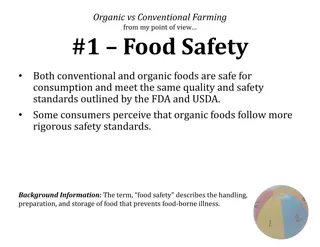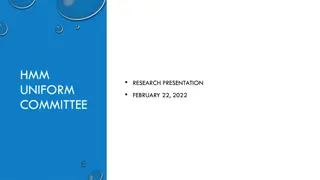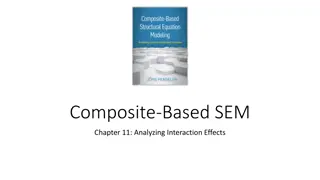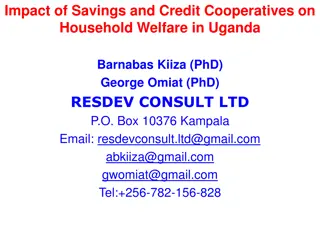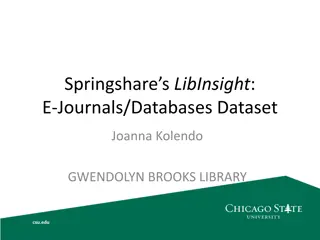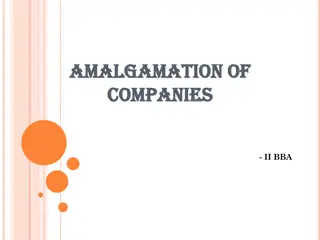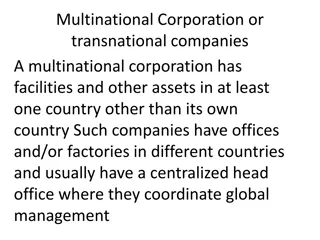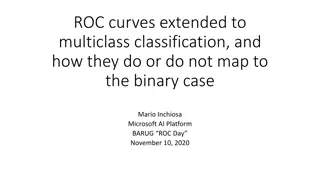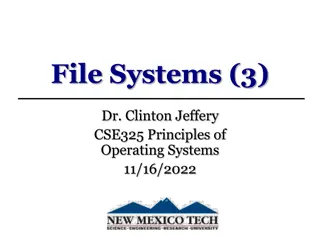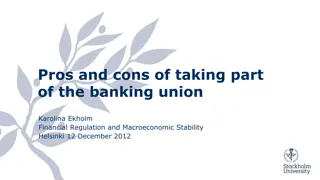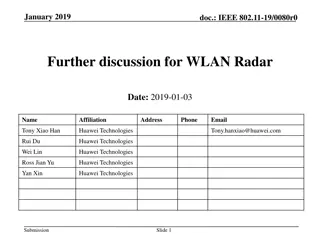Effects of Compliance to SASRA Regulations on SACCOs: Pros and Cons
The presentation by Chrispine Oloo to Mzima Springs SACCO members highlights the impact of compliance with SASRA regulations, covering the birth of SASRA, government intervention, and the pros and cons of compliance on SACCOs. The introduction of non-deposit-taking business regulations in 2020 has significant implications for SACCOs falling under different categories, such as those with non-withdrawable member deposits exceeding Kshs 100 million.
Download Presentation

Please find below an Image/Link to download the presentation.
The content on the website is provided AS IS for your information and personal use only. It may not be sold, licensed, or shared on other websites without obtaining consent from the author. Download presentation by click this link. If you encounter any issues during the download, it is possible that the publisher has removed the file from their server.
E N D
Presentation Transcript
THE SACCO SOCIETIES REGULATORY AUTHORITY (SASRA) THE EFFECTS OF COMPLIANCE TO SASRA REGULATIONS BY SACCOs : A HIGHLIGHT OF PROS AND CONS A PRESENTATION BY CHRISPINE OLOO TO MEMBERS OF MZIMA SPRINGS SACCO DURING THE MEMBERS EDUCATION FORUM HELD ON 6THNOVEMBER, 2021.
STRUCTURE OF THE PRESENTATION This presentation is structured into 3 parts: a) Birth of SASRA - vision, mission and mandate; Categorization of SACCOs; b) The Case for SASRA Intervention by the government; and c) Implication of the Policy Intervention: Some Pros & Cons of SASRA compliance on SACCOs.
THE BIRTH OF SASRA The Sacco Societies Regulatory Authority (SASRA) is a semi-autonomous Government Agency under the Ministry of Trade, Industry and Co-operatives enactment of the Sacco Societies Act in 2008 and inaugurated in 2009 to among other things, be responsible for the Licensing, Regulation and Supervision of Deposit- Taking SACCO Societies in Kenya. born through the
THE BIRTH OF SASRA CONTD.. In 2020, parliament amendment to the 2008 Act thereby introducing the SACCO Societies Non- Deposit-Taking Business Regulations of 2020, which effectively Authority powers to Licence, Regulate and Supervise SACCO Societies as well. moved an gave the Non-Deposit-Taking
THE BIRTH OF SASRA CONTD.. The new Specified Non-Deposit Taking Business Regulations, 2020 took effect on 1stJanuary 2021 and effectively brought on board three new clusters of Non-Withdrawable-Deposit-Taking under the regulatory and supervisory framework of SASRA, namely: SACCOs 1) Non-deposit taking business with a total non-withdrawable members deposits of Kshs => 100 Million; (which is where Mzima Springs Sacco falls);
THE BIRTH OF SASRA CONTD.. 2) Digital SACCOs - non-deposit taking business in which the Sacco society operates by mobilising membership and subscription to its share capital through digital or other electronic payment platforms; and 3) Diaspora business mobilises membership and subscription to its share capital from persons who are ordinarily resident outside the country. SACCOs in - non-deposit the Sacco taking society which
THE BIRTH OF SASRA CONTD.. The enforcement of the Sacco Societies Act, 2008 and the 2020 rules technically mandates SASRA to be responsible for Licensing, Regulation and Supervision of SACCOs providing both BOSA and FOSA services in the country.
CATEGORIZATION OF SACCOs Deposit-Taking SACCos (DT-SACCOs) Take deposits from members and offer withdrawable savings accounts services akin to those extended by commercial banks; Are also known as FOSA SACCOs and provide withdrawal and deposit services to their members; They are regulated by SASRA courtesy of the enactment and enforcement of the Sacco Societies Act, 2008. Non-Deposit-Taking SACCOs (Non-DT-SACCOs) These Saccos generally mobilize savings from their members in form of monthly deposits and share capital (this is where Mzima falls currently);
CATEGORIZATION OF SACCOs Non-Deposit-Taking SACCOs (Non-DT-SACCOs) The deposits are not withdrawable and are used as collateral for loans taken and / or guaranteed by the member; The saved deposits are refundable upon quitting membership through a formal application to the SACCO while share-capital is however non-refundable but can only be transferred or sold-off to another member through a formal procedure; These SACCOs are regulated by SASRA courtesy of the enforcement of the Specified Non-Deposit Taking Business Regulations, 2020 that took effect on 1st January, 2021 giving affected SACCOs until 31stJune, 2021 to comply with the new SASRA licensing, regulation, and supervision requirements as provided for in the rules.
THE VISION, MISSION & MANDATE OF SASRA Vision: To be a distinguished regulator of a financially inclusive and stable SACCO sector. Mission: To effectively regulate, develop the SACCO sector by promoting sound business enhance stability, financial services and member protection. supervise and practices growth, in order access to to
VISION, MISSION AND MANDATE OF SASRA Mandate: The mandate of the Authority as provided by the Act includes, among other things: a) To license Sacco societies to carry out deposit-taking business in accordance with this Act; b) To regulate and supervise Sacco societies; c) To hold, manage and apply the General Fund of the Authority in accordance with the provisions of this Act; d) To levy contributions in accordance with this Act; e) To do all such other things as may be lawfully directed by the Minister; and lastly, f) To perform such other functions as are conferred on it by this Act or by any other written law.
The Case for SASRA Regulation A number of factors influenced the government to introduce SASRA as a policy intervention, key among them being: 1) Noted framework for prudential regulation of deposit-taking SACCOs operative Societies Act Cap. 490 and the perceived need to streamline operations in the sector by strengthening their audit reporting; enabling provisioning for loan loss/write-off for non-performing loans (where justifiable); monitoring of SACCO s loan portfolio. lack of a harmonised legal in the Co- and enhanced
The Case for SASRA Regulation 2) Noted rising cases of mismanagement and misappropriation of members funds by unscrupulous SACCOs like witnessed in the case of Ekeza Sacco; 2) Noted performance by SACCOs leading to marginal profitability despite the huge potential enjoyed by SACCOs given their unmatched economies of scale; general poor financial
The Case for SASRA Regulation Contd 4) Dwindling confidence & Trust in SACCOs resulting in loss of members to banks and shylocks as alternatives for easy credit facilities, especially after the introduction of unsecured loans by commercial banks; 5) The investment/saving scheme-like SACCOs, e.g. DECI, which ends up collapsing investors' savings leading to general public outcry by concerned government for intervention. rising proliferation of pyramid with citizens to the
Implication of the Policy Intervention: Some Pros & Cons In her move to respond to and fix the cited challenges, the government enacted the Sacco Societies Act in 2008 to License, Regulate and Supervise all Deposit- Taking SACCO Societies in the county Kenya. However, the Act was later amended in 2020 to introduce the Non-Deposit Taking Business Regulations, 2020 that effectively SASRA s licencing, supervision and regulatory mandate to include Non-Deposit-Taking Sacco Societies as well. expanded
Implication of the Policy Intervention: Some Pros & Cons Granted, the enforcement of the 2008 Act and subsequent 2020 regulations has brought with it a rich mix of both positive and negative (pros & cons) implications on the affected SACCOs and the sector at large. Like any change process, the regulations has appreciably disturbed the status-quo in most SACCOs that has so far come under SASRA s regulatory and supervisory mandate, which the presenters calls the pros and cons of SASRA compliance as briefly shared herein.
Some Negative Cons of SASRA Compliance Sacco's Firstly, enforcement of these regulations has seen affected SACCOs adjustments in their administrative structures leading incurrence of additional operational expenses by the SACCOs costs that were otherwise previously not there! These extra costs definitely eats into the profits margins of the SACCOs hence lowering the returns payable to members on their monthly deposits and share-investments. forced operational to make and and current
Some Negative Cons of SASRA Compliance Sacco's Some notable new costs born by SACCOs under SASRA regulatory framework includes: Application and Licensing Fee @ 50k & 3k for Head Office and additional 20k licensing fee for each operational branch; Hiring of additional staff, where necessary, e.g. internal auditor & CEO for the case of Mzima; Securing extra space, where need be for extra staff & new services, e.g. FOSA.
Negative Cons of SASRA Compliance Contd.. In addition, SASRA regulated SACCOs may equally be compelled to: Retain higher proportions of their earnings to meet the required capital threshold determined by SASRA; Reduce interest and dividend margins paid out to their members to free-up more funds to bridge the noted shortfall in their core capital and reserve requirements;
Negative Cons of SASRA Compliance Contd.. Incur surcharge by SASRA on loan loss provisions in the audited accounts; Incur outstanding non-performing / defaulted loan proportion declared in the loan portfolio report and audited reports; surcharge by SASRA on Face possibility of closure by SASRA for failing the regulatory compliance test after the lapse of the specified timeline.
Some Positive Implications of SASRA Compliance On the other side, SASRA regulated SACCOs stand to enjoy a number of positive benefits, which has not only been confirmed by available empirical evidence from relevant thematic studies but also succinctly highlighted by the SASRA board chair in the SACCO supervision annual report, 2020.
Some Positive Implications of SASRA Compliance Some benefits of includes: Firstly, enforcement of regulations will help rid the sector of many budding fraudulent and pyramid-scheme-like entities known to rip-off the public of their savings by camouflaging as SACCOs then unexpectedly thereby going down with members savings and killing public hope and trust in SACCOs. SASRA regulation closing shop
Some Positive Implications of SASRA Compliance Secondly, the assures the financial stability and soundness of Non-WDT SACCOS hence enhance consumers confidence and trust in the SACCOs as viable financial institutions of choice where they can safely entrust their savings just like is seen with DT-SACCOs. regulations also members and
Some Positive Implications of SASRA Compliance Thirdly, SASRA regulations equally advocates for swift and efficient resolution of member complaints as and when they arise to help boost services patronage and satisfaction, especially for those seeking refund of their deposits/savings resigning from the membership. In this regard, SASRA requires SACCOs to make it fairly easy for desiring members to exit the membership, just as they should make it easy for those interested to join. member upon
Some Positive Implications of SASRA Compliance Fourthly, SASRA regulated enjoys the benefit of the SACCO Societies Fraud Investigation Unit (SSFIU), which is responsible for detection and investigation of any criminal activities within the SACCO sub- sector, especially the investigation of crimes relating to embezzlement of members' funds, cyber crimes, and illegal frauds by rogue entities posing as legit SACCOs. SACCOs also
Some Positive Implications of SASRA Compliance Fifthly, SASRA also hopes to tame cases of non- remittance of Sacco unscrupulous employers who subject affected members to unwarranted criminalizing the practice and pressing for criminal action on such employers. Sixthly, it builds public confidence and trust by promoting prudent administrative reforms to drive credibility and enable SACCOs better mobilize and retain members savings/deposits to provide a sure pool of funding for lending at affordable rates. deductions by default by policy, legal and
Some Positive Implications of SASRA Compliance Additionally, SASRA advocates for regulatory oversight, which ensures improved delivery of financial services by the SACCOs to their members driven by ease of access and convenience by advocating that SACCOs embrace prevailing technology solutions like enabled mobile services to manage and provide their services. This will ensure that members can successfully transact with their SACCOs from the comfort of their locations.
Some Positive Implications of SASRA Compliance Additionally, the regulations enables pre- emptive diagnosis through a combination of both onsite and off- site inspection of SACCOs to ensure necessary interventions is taken before it is too late; Finally, the regulations promotes prudential standards for risk assessment of the SACCOs liquidity, capital and governance structures and establishes deposit guarantee system to assure the safety of savings & deposits, which is a key performance indicator (KPI) for DT-SACCOs. of possible weakness
Conclusion In conclusion, we can see from the brief highlight of pros and cons that despite the prevalent misinformation about the impact of SASRA compliance on SACCOs, the number of benefits that a Sacco stands to gain from being SASRA regulated and supervised far outweighs the disadvantages. This should make SACCO members see SASRA as a partner very much interested in the collective welfare and success of Saccos and not one out to clip the gains made so far in the sector as some members have come to believe.
Conclusion Thank you all and God Bless! chrisoloo@yahoo.com
References 1. Buluma, F.C., Kung u, J. & Mungai, F.N. (2017). Effect of SASRA regulations on the financial performance of Nyandarua County s deposit taking SACCOs in Kenya. International Journal of Economics, Commerce and Management, https://1library.net/document/download/zx525xoq?page=1 Vol. 5, Iss. 7, p.614-636. 2. (2019, October 29). How to Know if Your SACCO is a Deposit Taking SACCO or not. Retrieved from https://blog.websacco.com/2019/10/29/how-to-know-if-your-sacco-is-a-deposit-taking-sacco-or- not/ 3. Kiragu, D.N. (2014). The effect of Sacco Societies regulatory authority s regulations on financial performance of Saccos in Nairobi County. [Master s thesis, University of Nairobi, Kenya]. Mushila, F.A. (2012). The effect of SASRA regulatory framework on the financial performance of savings and credit co-operatives in Kenya. [Master s thesis, University of Nairobi, Kenya]. http://erepository.uonbi.ac.ke:8080/xmlui/handle/123456789/6918 4. 5. Mutinda, D.N. & Wahome, M. (2018). Effect of prudential regulatory standards on the financial performance of deposit taking Saccos in Kenya. International Journal of Current Research, Vol. 10, Iss. 1, pp. 64787-64792. https://1library.net/document/download/zx525xoq?page=1 Retrieved from 6. SASRA https://www.sasra.go.ke/index.php?option=com_phocadownload&view=category&id=11:sacco- supervision-reports&Itemid=200 (2020). The SACCO Supervision Annual Report, 2020. Retrieved from 7. Onguka, E.M. (2014). The effect of regulations on the financial performance of deposit taking savings and credit cooperative societies in Kenya. [Master s thesis, University of Nairobi, Kenya]. http://hdl.handle.net/11295/95425





